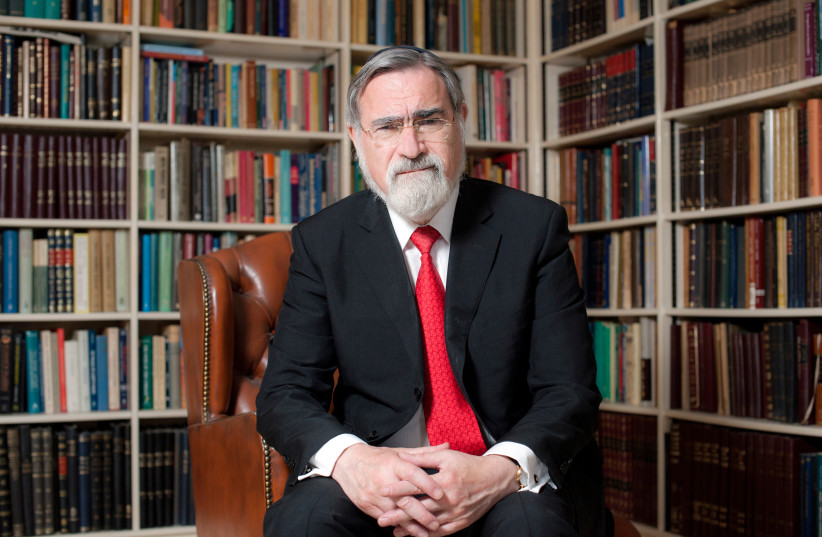
The Rothschilds have come to the rescue yet again.
For more than 150 years, members of the Rothschild family have been contributing individually and collectively to the development of the country which for almost 76 years has been known as the State of Israel. Rothschild generosity helped to transfer the personal archive of the late Lord Rabbi Jonathan Sacks, who was widely recognized as one of the most remarkable thinkers and orators of our times.
Respected by Jews and non-Jews around the globe for his clear moral vision, Sacks had amassed an extraordinary archive, which arrived at the National Library of Israel in Jerusalem in 50 large boxes, which, when digitized, will certainly add to the library’s prestige.
Sacks was chief rabbi of the United Hebrew Congregations of the Commonwealth for 22 years and was greatly admired by Jews and non-Jews in many parts of the globe.
A letter written by Sacks just before Passover 1998 relates to a period of disunity within the Jewish world.

“The Haggadah is not predicated on a simple concept of Jewish unity,” he wrote. “It presents to us a portrait of four children around the table. They are not the same. One is wise, one a rebel, one is simple, and one unable to ask. Their perspectives are different. Their voices are not in harmony. But they sit at the same table. They are members of the same family. They tell the same story.
“We are the people who carried with us the indelible recollection of centuries of suffering, not because we revel in it, not because we see ourselves as victims, but in order to remember that whatever else divides us, history unites us.”
Lady Elaine Sacks stated that her late husband had expressed great enthusiasm for the new National Library of Israel, which he had described as “the Home of the Book for the People of the Book.”
“It is fitting that his personal archive will be housed there,” she said.
The Rothschild branch that supported the acquisition of the archive was the Rothschild Foundation Hanadiv Europe.
What’s interesting is that although the Rothschild family has played a significant role in the development of Israel through its support of education (including pioneering educational television), culture, industry, healthcare, women’s rights, archaeology, and national buildings such as the Knesset and the Supreme Court, not all the Rothschilds were or are Zionists; some are not halachicly Jewish, and some are not Jewish at all.
Yet the Rothschild name is indelibly linked with Israel, and during emergencies when footing of the bill does not fit in with the national budget, it’s often a Rothschild who picks up the tab.
The loss of journalist Tom Weiss
■ THE FRIENDS and acquaintances acquired by American journalist and social entrepreneur Tom Weiss during his years in Israel will be sad to hear that he died suddenly last week.
Some of those who knew him in Israel were surprised to learn that he was 61 at the time of his death, because he always looked and acted much younger. Most people thought that Weiss – physically fit, with loads of energy and a friendly, hyper personality – was 20 years younger than his biological age.
Although he wanted to stay in Israel, Weiss returned to the US some four years ago to take care of his ailing mother. He was her sole caregiver. She died in January of this year, leaving Weiss to live alone. It was because he lived alone that he had been dead for two days before his death was discovered.
His good friend Gil Hoffman – who is executive director of HonestReporting, and a columnist with The Jerusalem Post, where he was previously the longtime senior political correspondent – is organizing a memorial tribute to Weiss at the Shir Hadash synagogue at 1 Yaakov Rubin Street, on Thursday, May 2, at 7:30 p.m.
The lack of bomb shelters for people with disabilities
■ URBAN PLANNERS don’t give sufficient thought to facilities for adults and children with disabilities. How can a person with a mobility problem reach a shelter in time to avoid a rocket? For that matter, is there a shelter near enough to reach? This is a problem which frequently confronts residents in the North and the South.
For some children with disabilities who were evacuated from their homes which are under attack by Hezbollah in the North and Hamas in the South, Jerusalem proved to be the perfect place. When war broke out, Shalva, the Israel Association for the Care and Inclusion of Persons with Disabilities, opened its doors to evacuees from southern border communities and told them that they could stay for as long as they needed.
The invitation was extended in particular to youth with disabilities, some of whom have been receiving therapeutic treatment at Shalva for five months and longer. If there was no such facility, these youngsters would really be in trouble.
The fact that Shalva represents the ever-widening vision of its founders, Kalman and Malki Samuels, has, over the years, enabled thousands of youngsters to find their strengths and to utilize those strengths.
How many similar facilities are included in the building boom that is changing the face of Jerusalem? Does Mayor Moshe Lion have an answer?
Mimouna is coming
■ ON ANOTHER note, people who find it difficult to digest matzah for a whole week can look forward to eating mufletas straight after Passover, when the nation will be celebrating Mimouna.
greerfc@gmail.com
